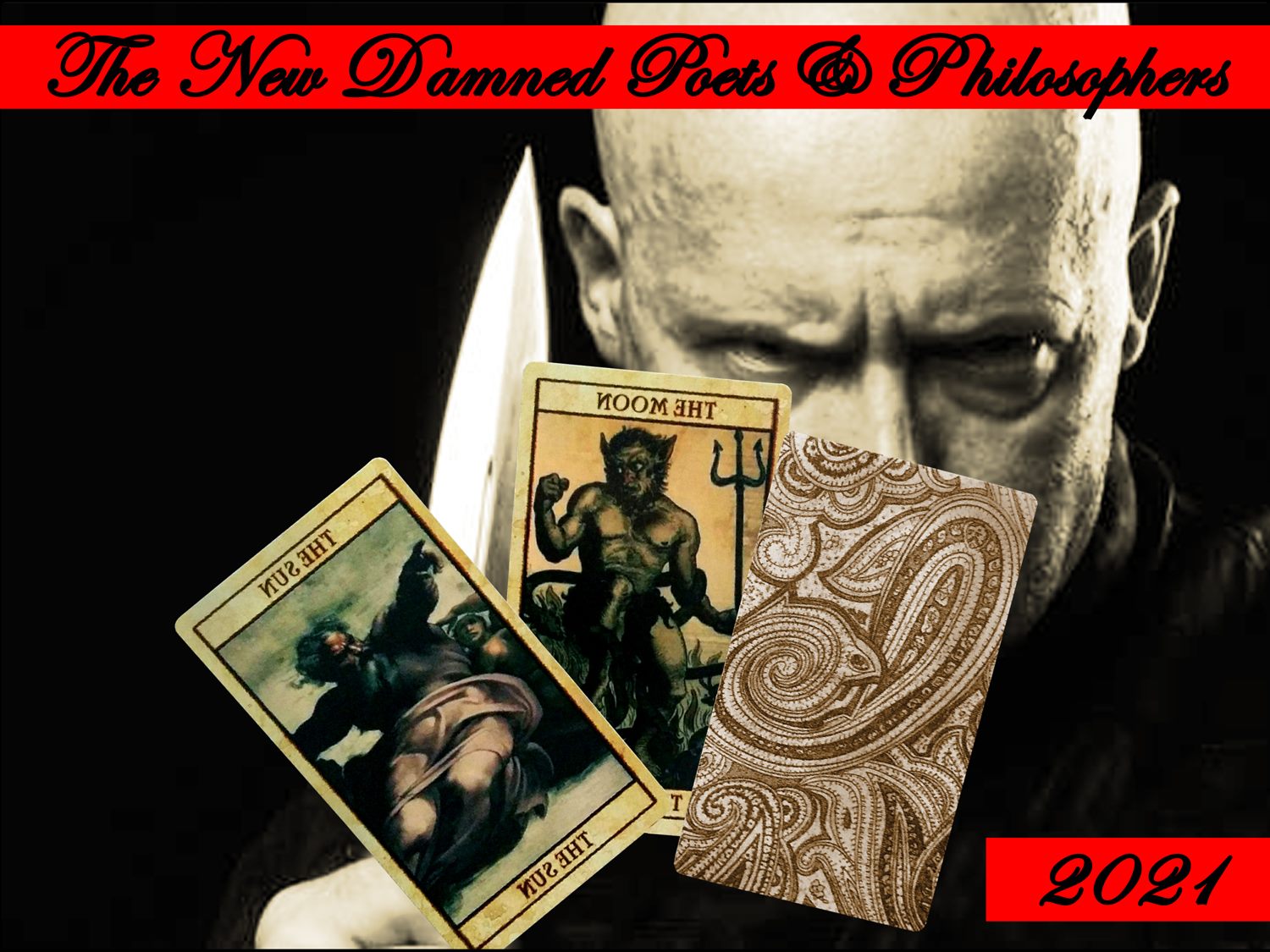About the Antiphilosophy of Azsacra Zarathustra
By Max J. Lewy
 Andrei Azsacra Zarathustra is the name of a Russian poet-philosopher who has developed a distinctive aesthetic over many years, which is at least as striking and meaningful as anything else currently available in our dilapidated contemporary culture, especially for one like me who become an outsider, rebel, and instinctive critic. His art, poems, and philosophical koans penetrate to the core of the solutions to many of the conundrums that most of us face or don’t face – that some of us are the mere stooges of – both individually and collectively. In them, we see a circumspect wariness for the modern world of mass man, illustrated by the quizzical look on the young Zarathustra’s face in some of his older photos. This glance bespeaks cool veracity — Another Reality! — that looks on us from without, and invites the viewer to stop and think, to re-consider, perhaps for the first time in his or her life.
Andrei Azsacra Zarathustra is the name of a Russian poet-philosopher who has developed a distinctive aesthetic over many years, which is at least as striking and meaningful as anything else currently available in our dilapidated contemporary culture, especially for one like me who become an outsider, rebel, and instinctive critic. His art, poems, and philosophical koans penetrate to the core of the solutions to many of the conundrums that most of us face or don’t face – that some of us are the mere stooges of – both individually and collectively. In them, we see a circumspect wariness for the modern world of mass man, illustrated by the quizzical look on the young Zarathustra’s face in some of his older photos. This glance bespeaks cool veracity — Another Reality! — that looks on us from without, and invites the viewer to stop and think, to re-consider, perhaps for the first time in his or her life.
It is the mild, polite, silent questioning of the viewer’s sanity, in a brotherly manner to “check yourself before you wreck yourself,” as Ali G. would say, that invites the possibility of true sanity as revealed in the rest of Zarathustra’s work, (combined with a little spice of divine madness). His poems, sayings, and symbols, provide a contemporary world of philosophical mythology, analogous to Nietzsche’s main work, Thus Spoke Zarathustra, which strikes the reader at a sub-conscious level, rather than merely an intellectual level. Indeed, it is possible that his work has had a similar effect on many to precisely that book, updated to a more contemporary atmosphere and the particular ambiance of today.
His movies, evoking a moody nether-world of romance with some of history’s greatest thinkers, and symbols of pride, grace, and long effort in a sundry and decimated world of over-flowing vulgarity, reveal the under-side melancholy to the agonized smile of everyday life. As Nietzsche said, the convalescent are often drawn to darkened caves; this, then, is the art of true convalescence — a true psychiatry, or anti-psychiatry — instead of the burning, intruding sunlight of the average ordinariness sheepish smile of the ‘They’. To me, it seems to be the natural home of the faithful few; those who treasure the deeper roots, as compared with the visible peaks, and seek to consolidate them via a conscientious world of disquiet, that makes its audience more cautious and circumspect, as well as ultimately more courageous.
His philosophy, with its conviction that in nihilism lies not just the problems, but also the solutions, admirably aligns with the Buddhist dictum of personal extinction as the path towards Nirvana; to my mind, this means the extinction of our false, socially-constructed selves, or unhealthy habits, as Good in itself, often by itself alone clearing the way for new, healthier, and better life to grow up within our soul of its own accord. In a world inundated with falsity, fake sheen, and confusing, misleading nonsense, both in the realm of ideas and all the endless material items of our modern consumerist culture, this positive nihilism provides the breathtakingly simple and necessary solution of relief. In a world that has grown fat on its prosperity, who better than a Russian warrior-monk to return us to the timeless essentials, in a way that mockingly, boldly, and insouciantly pairs the peak of decadence with the peak of asceticism, just to prove that it was possible after all, and anything we can do in the West, he can do better?
While to the superficial, intellectual clowns of the Right, his thought and writings may seem “unscientific” and “lacking philosophical rigor,” in reality, to the discerning mind, it is evident that he has penetrated to central concerns of our time and provided a simple and direct therapy, albeit one still shrouded in a slight, polite esotericism to keep away the truly vulgar; while other intellectuals, even many “philosophers,” just line their own academic careers with reams and reams of academic pontification — if not mere jargon — while never getting to the crux of the problem, and in their advice, often only serve, at best, to entrench the problem, so that others like Zarathustra can cleanse the attentive and good-natured listeners of all this rubble, those who do not despise reality too much to trust nothing but “Western Science” and “Scholarship,” no matter how frightfully meager its eudaimonic returns.
By juxtaposition to the evident profundity and the integrity of Zarathustra’s warrior spirit, it could be argued that the latter only further enhances itself by presenting the authentic as opposed to the façade of modern scholarship. In Zarathustra, we have the combination of sword and pen, of life and art, that makes his company a pleasure rather than a headache. He has painted this in such a way that it can genuinely reach others. While some would see this as immodesty, the enlightened would tend to see it more as generosity and true modesty.
The name “Andrei” reminds me of my brother’s name, which is “Alexander,” a word that literally means “friend of man.” I think that “Andrei” is the true friend of man, who displays considerable, perhaps enormous, bravery and excellence, both in his writings and in his life, in order to try to desperately save his fellow men and women of today from the truly sub-human degradation that they experience, ever-mounting, from modern ideology and modern chemistry. This, my friends, is no small gift, and makes Andrei truly a “shining light on a hill,” even if judging by some of his photos and sayings, he is a bit of a Devil both in front and behind the camera. Yes, Azsacra is the Devil of philosophy!
While Nietzsche’s lingering image was, despite his best efforts, more one of romantic, sympathetic, only partly-affirmative nihilism — the romantic life of the troubled philosopher, who eventually went insane with the struggle to affirm life — in our contemporary Zarathustra, we see the gestures of a Russian strongman who has conquered life by annihilating it beforehand, and leaving us only to take comfort in his austere feat. The effete intellectual world could hardly possess a more striking and salutary contrast.
Even though my name, “Max,” means “lightning,” Andrei Azsacra Zarathustra himself is a silhouette of a man climbing a mountain beneath the lightning storm and channeling it to his ends, as well. Perhaps most of all, Andrei Azsacra embodies intensity — the intensity necessary to destroy and the intensity required to truly create. And the purity of will and thought that accompanies that.
His life has been one of virility, honesty, cunning, and determination, that returns us to natural vigor and manly sensibilities in a world of domesticated livestock and inverse-cripples, who not only still exist in Plato’s Cave, but are now also constantly ducking their heads beneath its ceiling just to avoid offending the sheep next door. While most people today live in a world of excess information and stamp on each other’s feet for pleasure because they can’t be bothered to wait five minutes for the next elevator, Zarathustra has spent a lifetime using information carefully with utmost artfulness and good intention to subvert and heal the psychic neurosis of modern man. This is truly something to be desired and admired.
This is only a very partial snapshot, for the work Zarathustra contains many other great truths, both concrete and abstract. It would hardly be too much to say that his genius contains as much potential bounty as the novel Thus Spoke Zarathustra, which inspired his name; like that book, his work deals in illuminating tropes that have the power to captivate, inspire and enlighten beyond the mere conveyance of literal information or concrete insight. But, just as that book by Friedrich Wilhelm Nietzsche is often considered, and was considered by him, his central and most important work, Andrei Azsacra Zarathustra’s canon should be considered anew as on a similar scale of achievement for the modern, contemporary context, and therefore of greater interest to a readership already satiated and saturated with antique thinkers who have now for many of us grown a little stale and stuffy by comparison.
******
 Max J. Lewy (1983-) was born in the ex-coal-mining area of the South Wales valleys, UK, to a Jewish father and English mother. He self-published his first book of poetry, “Madness: A Form Of Love” in 2018, detailing his ordeals as a form of therapy (#PoetryNotPills #MeditationNotSedation) and defence, and is the winner of Realistic Poetry’s 2018 “Perspectives Of Love” Poetry Contest for the poem “River Of Eternity (For R. W.)”. Last year, he released new books in a series called “Gaslit By A Madman,” which includes poetry, prose, and also digital art, outlining a philosophy of madness riffing on the “Joker” movie. Max J. Lewy is a paradoxical Joker-philosopher. Absolute freedom!
Max J. Lewy (1983-) was born in the ex-coal-mining area of the South Wales valleys, UK, to a Jewish father and English mother. He self-published his first book of poetry, “Madness: A Form Of Love” in 2018, detailing his ordeals as a form of therapy (#PoetryNotPills #MeditationNotSedation) and defence, and is the winner of Realistic Poetry’s 2018 “Perspectives Of Love” Poetry Contest for the poem “River Of Eternity (For R. W.)”. Last year, he released new books in a series called “Gaslit By A Madman,” which includes poetry, prose, and also digital art, outlining a philosophy of madness riffing on the “Joker” movie. Max J. Lewy is a paradoxical Joker-philosopher. Absolute freedom!


